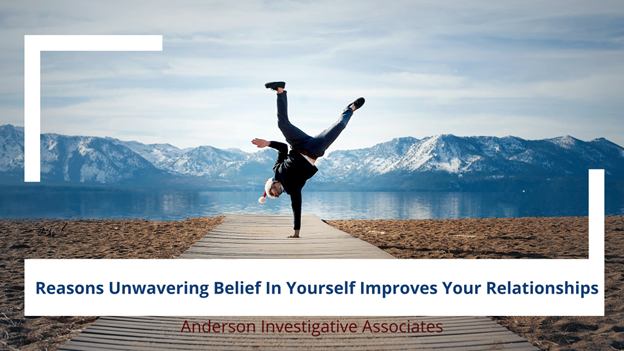
“A relationship without trust is like a car without fuel, it can’t move ahead.”
– Invajy –
We are exploring relationships here. This is the second in a series of three blogs on improving relationships. In the last one we looked at building strong and supportive relationships and their importance in the world of interviewing and life.
Here we are looking at the importance of an unwavering belief/confidence in yourself. In interview training I often mention that research indicates the number one reason that those liar liar pants on fire we are talking to tell us the truth is because of the confidence and credibility of the interviewer. Please note that what we must show is confidence, not arrogance…..there is a huge difference. Like the last blog, the more of this you can do in your work world and your great life arena, the more credible and confident you will be. Consistency builds success.
You probably already are aware how having an unwavering belief in yourself improves your work life or even helps you be more confident in your everyday life. But were you aware of just how much having this kind of self-belief improves your relationships with others, as well?
Consider the following:
- You’ll be More Genuine
When we’re unsure of ourselves, it’s easy to adopt a persona, especially when around people we’re hoping to impress. But how do others around you like the ‘fake’ you? Sooner or later, the reality always comes out, and when it does, your partner will feel betrayed. Even in non-romantic relationships, trying to be something you are not is a sure recipe for disaster. What does this action do to you credibility?
- You’ll Contribute More to the Relationship
When you’re unsure of yourself, you tend to let the other person make all the decisions or carry the weight of maintaining the relationship.
While some people don’t mind taking the lead, this does lead to an unbalanced relationship which can even turn into codependency if you’re not careful. The question is, do you want a caregiver or a partner? This is an issue at work and in personal relationships.
- Confidence is Attractive
Ask anyone what they notice first about a person, and the answer which comes up more often than any other is, “Confidence.” When you see someone who knows who they are, are comfortable in their own skin, and seem to have a clear view of where they’re going, you’re just drawn to them naturally. Notice, again, the word is confidence, not arrogance.
- There’s Less Baggage
People who believe in themselves don’t need to carry the opinion of others around with them anymore. For example, if a former supervisor put you down, you don’t care because you know you’re worth more than this. More importantly, confidence frees you up to fully enter into new relationships with others without those old expectations or negative emotions to trip you up.
- You’ll Argue Less
If you get into a disagreement with your friend or colleague, you’ll be less apt to take things personally and more willing to work through the problem. An important bonus? You won’t be so caught up in the other person’s opinion of you to where you put up with abuse or leave the argument crushed and broken. People with unwavering self-belief know when to walk away from the fight altogether. When it comes to interviewing we shouldn’t be arguing at all, so self-confidence helps to control that.
- You Will Be Respected
Finally, when you have a strong sense of self-confidence, you have a strong feeling of self-respect, which goes hand in hand with one another. When others see you treat yourself as worthy of this respect, they are more likely to treat you with respect as well.
As a side note, relationships of every variety always work out best if you have a strong feeling of self-worth. The rest of the world already knows confident people are people worth knowing. So, is this who you are and what you can expect?
There are huge benefits to improving your unwavering belief and confidence in yourself. It is a valuable endeavor that can positively impact various aspects of your life. Here are some strategies to consider to build and foster confidence:
- Self-awareness:
- Understand your strengths, weaknesses, values, and interests. This self-awareness can provide a solid foundation for building confidence.
- Set realistic goals:
- Break down your long-term goals into smaller, achievable steps. Success in these smaller tasks can boost your confidence over time.
- Positive self-talk:
- Challenge negative thoughts and replace them with positive affirmations. Encourage yourself, remind yourself of your achievements, and believe in your abilities. Continue to build and grow.
- Visualize success:
- Imagine yourself succeeding in your endeavors. Visualization can help build confidence and reduce anxiety.
- Take care of your physical health:
- Regular exercise, a balanced diet, and sufficient sleep can have a significant impact on your self-confidence. When you feel physically well, your mental state tends to follow suit.
- Learn and develop new skills:
- Continuously invest in your personal and professional growth. Acquiring new skills and knowledge can boost your confidence in your abilities.
- Seek feedback:
- Welcome constructive criticism and use it as an opportunity to improve. Constructive feedback can help you grow and validate your strengths.
- Surround yourself with supportive people:
- Build a network of friends and mentors who encourage and believe in you. Their support can reinforce your self-confidence.
- Face your fears:
- Step out of your comfort zone and confront your fears. Each time you overcome a fear or challenge, your confidence will grow.
- Celebrate your successes:
- Acknowledge and celebrate your achievements, no matter how small they may seem. This positive reinforcement can help you maintain confidence.
- Practice resilience:
- Understand that setbacks and failures are a natural part of life. Instead of dwelling on them, use them as opportunities to learn and grow, which can ultimately strengthen your belief in yourself. Interviewing is all about this.
- Keep a success journal:
- Document your successes, big or small. When you’re feeling low on confidence, revisit your success journal to remind yourself of your capabilities.
- Focus on self-compassion:
- Be kind to yourself and forgive your mistakes. Self-compassion can help you maintain a healthy self-esteem and overall confidence.
- Seek professional help if needed:
- If you struggle with self-confidence due to deep-seated issues, consider seeking therapy or coaching from a professional who can provide guidance and support.
Remember that building unwavering belief and confidence in yourself is an ongoing journey. It may take time, but with persistence and dedication, you can achieve the level of self-confidence you desire. This self-confidence will benefit every area of your life.
Anderson Investigative Associates is positioned to custom-tailor training to your specific needs. If you have any questions or would like to discuss the above issues of self-worth and self-confidence, or any training need, please reach out. Additional issues pertaining to interviewing, auditing, and investigations can be found in other blogs and videos that we have produced and are contained in most blocks of instruction that our company presents.
If you have additional questions, comments, or have an interviewing topic you would like me to address, give me a shout. In the meantime, be well, stay safe out there, and get busy building confidence and credibility in all areas of your life to strengthen relationships.
Mark A. Anderson
Director of Training and Development
Anderson Investigative Associates, llc
114 Loucks Avenue
Scottdale, PA 15683
manderson@andersoninvestigative.com
tel:912-571-6686
.
